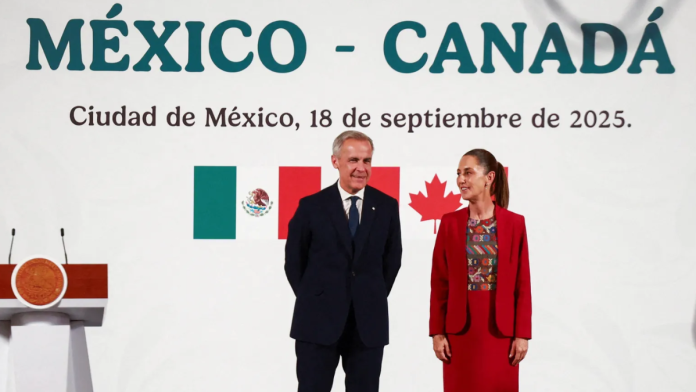Canada and Mexico are taking steps to strengthen their trade and security partnership as both countries face growing economic pressure from the United States.
During a key bilateral meeting in Mexico City, Canadian Prime Minister Mark Carney and Mexican President Claudia Sheinbaum agreed to expand cooperation in trade and security. The two leaders also reaffirmed their commitment to maintaining a shared partnership with the US.
“We make each other stronger, and together, we are stronger,” Carney said at a joint press conference, emphasizing the importance of unity amid US trade pressures.
Rising Trade Pressures
Both Canada and Mexico have been directly affected by tariffs imposed under President Donald Trump. Canada faces tariffs of 50% on steel, 25% on vehicles, and 10% on oil and gas. Mexico has been hit with 25% tariffs on certain pharmaceuticals, as well as a 25% “fentanyl tariff” aimed at addressing border security concerns.
New 50% tariff in Mexico threatens Tesla and BYD’s electric vehicle sales
Although many goods from both countries are exempt under the US-Mexico-Canada Agreement (USMCA), the sector-specific levies have disrupted key industries. Canada’s exports to the US, in particular, have taken a noticeable hit, while Mexican exports have performed relatively better in 2025.
Trade between Canada and Mexico was valued at C$56 billion ($40.5 billion) in 2024. Both governments view a strengthened partnership as a way to support their economies and mitigate the impact of US tariffs.
The USMCA, which has shaped North American trade since 1994, is scheduled for review in 2026. Early discussions have already begun in Washington, where American businesses are being asked for feedback on potential changes. Both Canada and Mexico have expressed support for the agreement, noting its role in boosting competitiveness across the region.
A Warmer Relationship
This meeting marks Mark Carney’s first official visit to Mexico as prime minister. The interaction between Carney and Claudia Sheinbaum was noticeably warmer than in previous years, with exchanges of gifts and friendly remarks during the joint news conference.
Tensions had flared in the past when Canadian officials were accused of pursuing a separate trade deal with the US, leading to criticism from Mexico. At the time, Sheinbaum stressed that Mexico must be respected by its trading partners. The tone now reflects a stronger focus on partnership and collaboration.
In addition to trade, the leaders discussed border security and transnational organized crime, issues that Trump has used to justify tariffs on both countries. Political analysts, including Sebastián Vallejo Vera, note that Canada and Mexico are carefully showing unity without appearing to challenge the US directly.
Sanctions without teeth: Canada targets Russia, Iran, and North Korea but enforcement collapses
Observers also point out that Carney may benefit more from closer trade ties with Mexico than vice versa. While Canadian exports to the US have struggled under rising tariffs, Mexico’s exports have held relatively steady. There is also a perception that Canada has historically focused on strengthening relations with the US while sidelining Mexico.
Strengthening Trade and Security
Both countries aim to deepen trade relations while addressing shared security concerns. Canada hopes to boost exports to Mexico, and Mexico continues to protect its economic interests and maintain strong border security.
By reaffirming support for the USMCA, both leaders highlight the importance of North American trade cooperation. The agreement has already proven critical in shaping trade patterns across the continent, allowing many goods to bypass US tariffs, even as certain sectors face high levies.
The renewed focus on collaboration between Carney and Sheinbaum demonstrates a strategic approach to navigating the pressures of US protectionism. The two leaders’ commitment to partnership is a clear signal that Canada and Mexico are working together to safeguard their economies while continuing dialogue with Washington.
